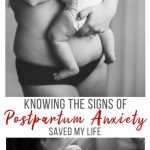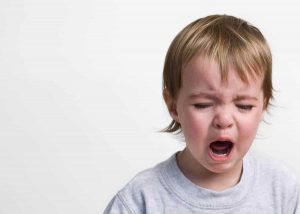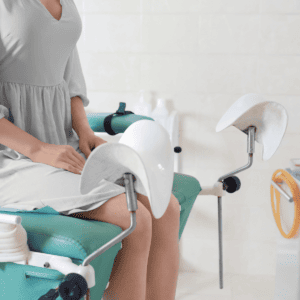In the hospital elevator heading to the car with my new baby, I burst into tears. This was the beginning of parenting worry, I thought. But within a few short days, I knew this was more. I’m so grateful I knew the signs of postpartum anxiety, understood what postpartum anxiety is, and already had a plan for seeking treatment for my symptoms.
People are beginning to talk about postpartum depression more and more, and I’m so thankful for it. But we need to be discussing postpartum depression AND anxiety!
People’s lives depend on our understanding these truly serious issues. Here, I’ll tell you my story, while also helping you understand more about postpartum mental health.

This site contains affiliate links, meaning that we earn a small commission for purchases made through our site. We only recommend products we personally use, love, or have thoroughly vetted.
I’m a Postpartum Anxiety Success Story
But it sure as hell didn’t feel that way at the time. It felt like the deepest, darkest, most difficult time of my entire life.
When we brought Jack home from the hospital, my entire world crumbled. In a mere matter of minutes, I went from being a happy new mom in the hospital to a pile of rubble who could barely do as much as hold her new baby.
It began in the ride down the elevator to leave the hospital. After I gave birth, I had been fine. I didn’t feel sad or scared. I had no anxious or depressive symptoms in the hospital.
I had been pulled together (as much as one can be immediately following the medical scare of preeclampsia and an early induced labor).
In a wheelchair in the elevator, holding Jack in his car seat while Husband pushed me to the car, I held back tears. I strapped myself in while Husband clipped Jack into the infant seat base.
I waited for all the doors to shut, and I broke down.
Sobbing.
If I wanted to keep this story short, I’d just admit to this truth: I mostly just continued sobbing for the next 3-4 months.
I’m not talking crying, or even crying hard. I’m talking extreme, hyperventilating, cannot-possibly-catch-a full-breath, huffing-and-puffing, lips-turning-purple SOBBING.
Oh, The Guilt
And imagine that mom guilt that accompanied this anxiety! After all, I was a recurrent miscarriage success story.
I’d gone through years of heartache, put my body through extreme trauma, and spent tens of thousands of dollars to get through my 4 miscarriages and finally have this baby.
How could I possibly feel so miserable?
My therapist later told me that women with a history of fertility-related trauma are actually at a greater risk for postpartum depression and anxiety.

So if this is you, mama, experiencing postpartum mental health struggles and feeling guilty about it, please know that it’s okay.
You are not alone. This happens to a lot of women. It does not make you ungrateful. It does not make you a bad mom.
You are doing your best! And there is help available!
Think you might need help? Call or text Postpartum Support International at any hour, day or night
CALL 1-800-944-4773 or TEXT 503-894-9453.
What is Postpartum Anxiety (PPA)?
Postpartum anxiety is a mood disorder that occurs after giving birth, and it is a serious disorder for which I recommend treatment.
It is NOT normal emotions after giving birth–feeling hormonal and having the urge to check and make sure your baby is still breathing. It is a strong, lingering sense of severe anxiety.
If you worry some during the postpartum period, that’s normal. If you have spiraling thoughts about the bad things that could happen to your baby (or in general) that you can’t get rid of, then you might have postpartum anxiety.
This mood disorder is often, but not always, accompanied by physical symptoms, such as panic attacks.
According to Postpartum Support International, about 10 percent of women develop postpartum anxiety. Some experience it in addition to depression, while others experience anxiety alone.
Postpartum Anxiety Symptoms
There are a number of different symptoms of PPA, and it’s vitally important to understand that you might not have all symptoms.
Suffering from postpartum anxiety looks different for everyone, and some signs are more recognizable than others.
For instance, in the early days of the postpartum period, my anxiety levels were so severe that I was completely dysfunctional. I was having panic attacks and severe insomnia.
Later, when I thought my PPA was gone, I sought medical help for vertigo and hot flashes, only to discover that I was having a much milder version of a panic attack.
That is, the signs of postpartum anxiety look different for everyone and at different times.
According to Postpartum Support International, common postpartum anxiety symptoms include the following:
- Constant worry
- Impending sense of something bad happening
- Racing or spiraling thoughts
- Sleep problems (beyond your baby not letting you sleep)
- Appetite disruptions
- Restlessness
- Physical symptoms like dizziness, hot flashes, nausea, hyperventilation, and more
My Early Symptoms: More Than Normal Worry
During the early postpartum period, nighttime was the worst, and it was not normal emotions after giving birth.
It’s no secret that nights with a new baby are HARD. That you go into survival mode. That you’re exhausted.
This is true for everyone.
That nights were simply “hard” was not true for me.
For me, nights were the end of the world, an abyss of darkness through which I could not possibly survive until sunlight.
What even was sunlight? Would I see it? Could I see it?
I didn’t sleep. Not because Jack kept me awake, but because I was too terrified to sleep.
Terrified of what? I couldn’t really tell you. Unlike many women with PPA, I did NOT experience racing thoughts about something bad happening. I simply felt a general sense of terror.
Was I afraid Jack would stop breathing? Maybe.
Convinced after the loss of 4 pregnancies that the other shoe MUST drop at some point, and I’d lose Jack, too? Very possible.
Was I dealing with a chemical imbalance that made life almost impossible to live? YES!
Thankfully, due to a history of generalized anxiety disorder, I recognized the signs, and I knew I needed treatment.
Seeking Postpartum Anxiety Treatment
Let me make something VERY clear. If you think you might need treatment for postpartum anxiety, please reach out for help. Call your doctor, find support groups, get in touch with a local therapist, or contact Postpartum Support International.
I recommend Postpartum Support International for a few reasons.
- 24-hour helpline
- Ability to call OR text
- Experts are trained specifically for postpartum mood disorders
- Ability to connect you with a specialized clinician in your area
I remind women that they can also contact their midwives or OBs, but since they aren’t trained mental health providers, they can provide advice, but diagnosis may be less accurate and treatment less effective.
Postpartum Support International is my preferred contact.
Need the helpline? CALL 1-800-944-4773 or TEXT 503-894-9453.
Also, I want to make a really big deal that, if you think you might need help, seek it. Because those around you might not know.
Everyone Said My worry Was normal. It Wasn’t.
Everyone said what I was experiencing was normal.
“All new moms worry,” they said. And that is probably true. But I knew this wasn’t normal worry.
And yet, when I could barely breathe, how was I to tell them they were wrong?
“No new moms get sleep,” people told me. “This is totally normal.”
These are among the most dangerous words we can say to a new mom without truly knowing what’s happening inside her mind.
We don’t know if a mom is experiencing normal emotions after giving birth because we do not live inside her mind or body. Only she can know.
With mental health care available, it’s essential that we trust ourselves if we suspect mental illness. Family members and friends don’t know our minds; WE do.
What’s Normal and What Isn’t
You know what’s normal? Worry.
You know what’s normal? Checking every now and then to make sure your newborn’s chest is moving.
You know what’s ALSO normal? Sleeping in between these things.
You know what’s NOT normal? Falling asleep for 5 minutes and waking up to a full-blown panic attack–hyperventilating, sobbing, unable to breathe, tight chested, wanting to scream but not having the air in your lungs to do it.
You know what’s not normal? Sleeping for 15 total, non-consecutive minutes a day.
You know what’s not normal? Collapsing to the floor with no medical cause because you just can’t take another step.

Postpartum Depression and Anxiety: What’s the Difference?
Just like it’s easy for people to say that worry is normal after giving birth, it’s also easy to overlook postpartum depression (PPD).
After all, the “baby blues” are something we all know about–a time when new moms often feel down about life, probably because their hormones are still returning to normal, they’re in physical pain, and they miss the regular company of adults. (This usually occurs in the early weeks of postpartum, during maternity leave.)
What I want to highlight here is that there is a difference between postpartum anxiety and postpartum depression!
The two can exist at the same time, but they are not the same thing.
Symptoms of postpartum depression include, but are not limited to:
- sadness
- excessive crying
- difficulty bonding with baby
- feelings of hopelessness
- mood swings
- inability to enjoy things that were once enjoyable
Postpartum anxiety can cause some of these symptoms, but likely because the person suffering also has postpartum depression.
I had both, and including the time I went through infertility and recurrent miscarriage, it was the darkest time in my life.
*Note: There are other postpartum mood disorders as well, including postpartum psychosis, OCD, and bipolar disorder.
What About Postpartum Rage?
Postpartum mood disorders can also have another, darker tone that very few people talk about: rage. Postpartum rage can be associated with either PPD or PPA.
What is postpartum rage? It’s anger, but beyond anger. It’s generally sudden and severely intense.
The Pacific Post Partum Support Society explains, “Anger is probably one of the least discussed components of the motherhood experience and one of the least acknowledged facets of postpartum depression and anxiety.”
If you are experiencing uncontrollable anger that could be described as rage, please seek help.
Also, know that just like any other postpartum mood disorder, postpartum rage is not your fault.
This isn’t YOU. This is a chemical imbalance in your brain, and you CAN get help for it.
Let’s Learn to Help People Dealing with Postpartum Anxiety
When we tell new moms their postpartum anxiety is “normal,” we diminish their experience. And we threaten their lives.
I get emails from women all the time who are struggling with dealing postpartum anxiety, asking if what they’re experiencing is normal.
“Are these normal emotions after giving birth?”
“Am I reading too much into this?”
“My husband says postpartum anxiety isn’t real.”
Bullshit.
My response is the same every time. It goes something like this.
“I’m here for you, I will listen to whatever you need to say, and you’re worthy of enjoying this postpartum experience. I can’t tell you if you have postpartum anxiety; I’m not that kind of doctor. What I can tell you is that what you’re describing sounds very much like what I/someone I know experienced with postpartum anxiety. And if you’re questioning whether you have it, I believe it’s worth reaching out for help–or at least for a mental health assessment.”
It’s Not a Quick and Easy Fix
I’m going to tell you something you don’t want to hear, followed by something you do:
- My postpartum anxiety lasted until just after Jack’s second birthday
- Thanks to effective treatment, it significantly improved within weeks
When my PPA started, it was something that a person with fewer resources may never have crawled out of.
But because I already had a therapist who had pre-scheduled a phone appointment after Jack’s birth, I had somewhere to turn.
He referred me to a postpartum psychiatrist, who managed my therapy and medication during the early weeks of postpartum Hell.
Thanks to medication and various types of therapy combined (insight-oriented therapy, cognitive behavioral therapy (CBT), acceptance and commitment therapy (ACT)), I was MUCH improved within about 6 weeks.
But With Treatment, It Will Get Better
One night at dinner, 12-week-old Jack was asleep upstairs.
My parents were in town, and my dad (who has very little understanding of mental health concerns) wanted to talk to me about my experience dealing with postpartum anxiety.
He wanted to understand.
Not because I was a basket case or dysfunctional. But because he couldn’t wrap his mind around the turnaround. How had I gone, in just 12 weeks, from unable to care even for myself to a relatively typical new mom?
When he brought it up, my dad, historically the skeptic, was wide-eyed, curious, and noticeably serious.
He put down his fork, looked across the table into my eyes, and said the following:
“I don’t know much about these things. But the difference between you now and you 12 weeks ago is amazing. Clearly, something was wrong, and something is working.”
“So you really see a difference?” I asked.
I knew there was one, but hearing it somehow felt fulfilling.
He just smirked and shook his head. “It’s the damndest thing I’ve ever seen.”
General FAQ
How do I cope with postpartum anxiety?
Dealing with postpartum anxiety is extremely overwhelming. Trust your instincts that there’s a problem and reach out for help. Contact Postpartum Support International by phone at 1-800-944-4773 or text at 503-894-9453.
The symptoms of each are different, although they can exist together. Postpartum anxiety often involves symptoms like constant worry and spiraling thoughts, while postpartum depression signs include extreme sadness, excessive crying, & feelings of hopelessness. They may exist together, and both need qualified medical care.
Crying is a totally normal part of the “baby blues,” as families adjust to their new lifestyles and mom’s hormones shift. But excessive crying, feelings of hopelessness, and racing thoughts may be signs of a more serious maternal mental health disorder.
While there is no known link between breastfeeding and anxiety, other factors can certainly make it seem like the two are connected. For example, if a new mom isn’t making enough milk, or her baby can’t latch, she may experience feelings of inadequacy that could lead to anxiety.
While you cannot necessarily prevent PPA, understanding the risk and symptoms can lessen your chances of experiencing it. While pregnant, find a local postpartum therapist and program their number into your phone. That way, if you need support, you’re already prepared.













Hello! I appreciate your post about postpartum anxiety very much and I applaud your honesty in discussing it so openly!
My name is Dyane Harwood and I’m the author of the memoir “Birth of a New Brain—Healing from Postpartum Bipolar Disorder.” I’m emailing free PDF review copies of this book to anyone who would like to learn about postpartum bipolar disorder. I also wrote about my struggles with anxiety in my book. I explained how I was able to safely wea myself off benzodiazepine medication.
“Birth of a New Brain” has been endorsed by PSI Executive Director Wendy Davis, Dr. Kay Redfield Jamison, perinatal psychiatrists Dr. Samantha Meltzer-Brody, Dr. Verinder Sharma, Dr. Jane Hanley, and Dr. Carol Henshaw, and 20 other bipolar and perinatal mental health experts.
Readers are welcome to email dyane@baymoon.com for a copy.
For more information and reviews, please visit the Amazon book link:
https://www.amazon.com/Birth-New-Brain-Postpartum-Disorder-ebook/dp/B075GXM6CV
Warmly,
Dyane Harwood
p.s. This is a link to my SELF Magazine article; you might like to check it out:
https://www.self.com/story/postpartum-bipolar-disorder
My comment is going to touch on the fact of dealing with Anxiety altogether. Many children have anxiety and are never treated for it. They come into adulthood and perhaps it’s developed into something more profound.
Now we’re having babies and experiencing hormonal changes and the chemical imbalance is a monster. Some how what’s noticeable to family, teacher’s, doctor’s, spouses, lover’s and friends has either been ignored. Maybe it was brought up but because the family did not understand mental illness they ignored it and prayed about it. Now you’re a teen dealing or an adult trying to deal with these issues.
I’m speaking about Generalized Anxiety because l feel like it is a very broad problem… This problem can start in childhood and continue into Adulthood, Motherhood and Postpartum.
So knowing that, what advise do we get when dealing with pregnancy. Do we get all the information that’s needed from our OBGYN’S post birth so that we can identify Postpartum Depression. Should the doctor’s be notifying loved ones that she probably should have support in the home. So what’s the solution probably more funding, dealing with mental health and making sure it’s classified correctly. So that the resources are there for all and making sure that little girl’s and boy’s get resources in school. I’m not speaking about pushing drug’s, I’m speaking about Psychologist and Psychotherapy in that school setting… So when they become adult’s, mother’s and father’s we know how to challenge ourselves and understand irregular brain activity and identify our own dysfunction and seek help.
I wish that more children had access to mental healthcare, not for medication, as you said, but for therapy if it’s needed. There are so many great therapies for children—play therapy, art therapy, music therapy, etc. I can recognize my GAD as early as 4th grade, but I bet it began even earlier. My parents had no idea or they would’ve gotten me help. So for someone like me, parent education about mental health would’ve been a game changer. But for those who can’t access mental healthcare even if they know someone needs it, we need more resources. I don’t know how to make that happen, but I certainly think these conversations are a necessary step!